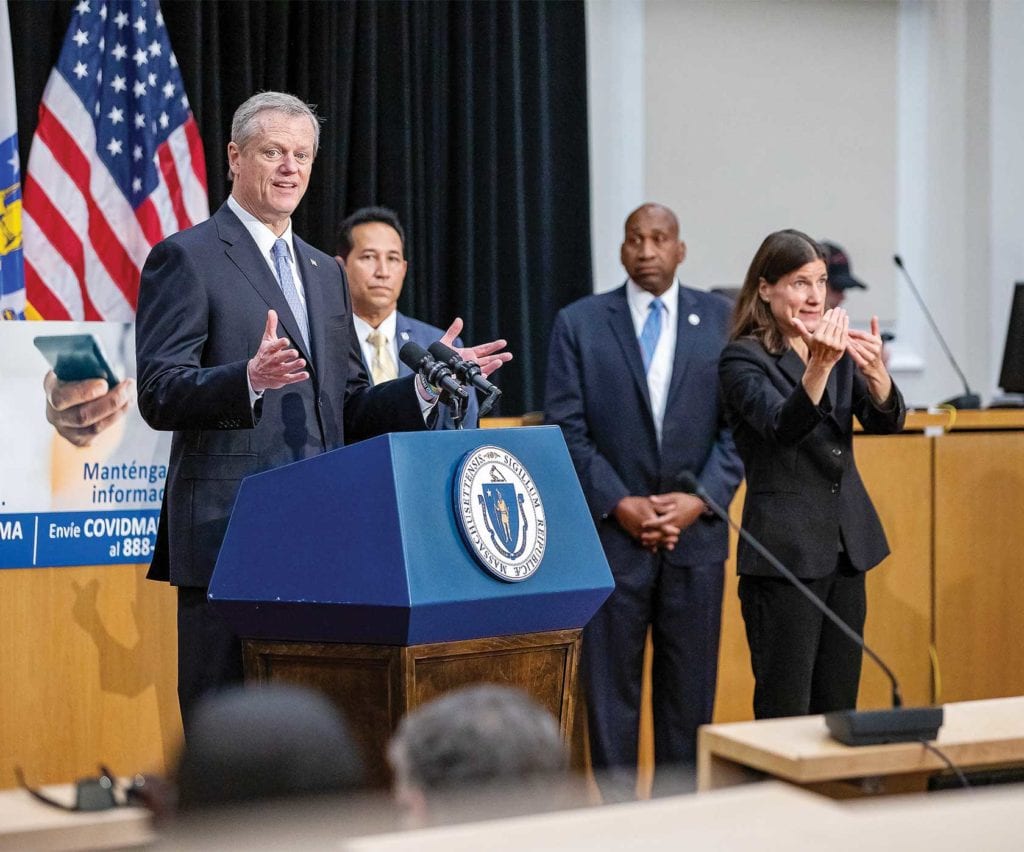Electeds struggle with police funding
Baker draws fire with pay bonus, activists picket at Walsh residence

On Friday, Gov. Charlie Baker joined state Rep. Russell Holmes in a show of support for legislation that would require certification for police in Massachusetts, a measure widely seen as bringing accountability to law enforcement.
Yet in the same legislation, Baker slipped in a measure that would pay officers $5,000 for trainings. This measure comes at a time when activists in Massachusetts and across the country are calling for police departments to be defunded and resources diverted to social services.
Baker’s pay bonus measure underscores a growing rift between elected leaders and anti-police-violence activists. In Boston, Mayor Martin Walsh has resisted calls from activists and some city councilors who are calling for a 10% cut to the police budget, and instead proposed a more modest 2.4% cut.
Both Baker and Walsh have drawn fire for their seeming support for increased police funding. Demonstrators last week picketed in front of Walsh’s Dorchester home. During a demonstration at the State House Monday, protesters blasted Baker’s proposal.
“Not only is it disrespectful, but it goes to show how little he values black lives,” said anti-violence activist Monica Cannon-Grant.
That Baker is advancing certification, legislation Holmes has sought to advance unsuccessfully for the last six years, indicates a growing sense of urgency around police reform. Under the legislation, officers would be required to pass a certification test, renew their certification every three years and be subject to decertification in cases of serious misconduct. According to the bill, officers can also be decertified after specific use-of-force cases and for failing to intervene when another officer engages in misconduct on the job.
The bill creates a Police Officer Standards and Accreditation Committee, at least half of whom would be required to be persons of color. At a briefing last week, Lieutenant Governor Karyn Polito noted that Massachusetts is one of just four states without a certification process for police.
“The high standards of training we require for our police departments give us a strong foundation on which to build one,” she said.
Taking a different tone, Holmes referred to the Massachusetts Black and Latino Legislative Caucus’ police reform legislation, including mandatory collection and sharing of data on police stops, special independent investigators for police shootings and the diversification of the state police force.
“A state police force that is 95% male and 90% white is unacceptable,” he said.
Caucus members hope to advance their measures before the legislative session ends July 31.
“We want the best police officers we can possibly have,” Holmes said. “My neighborhood is not asking for less police. We want the best, most trained officers we can have, period.”
In addition to their meeting with Baker, Caucus members met with the Massachusetts Law Enforcement Policy Group, which represents some of the state’s largest police unions.
The legislators and union members reached agreements on several police reforms, including banning chokeholds, the standardization of training procedures and protocols across the state, training and guidelines around how to intervene when officers are engaging in misconduct and guidelines to ban use of excessive force.
Caucus Chairman Carlos Gonzalez said the discussion was “meaningful,” and thanked the union leaders for making progress on the reforms.
“Their input is invaluable as we work to craft legislation to improve law enforcement services to communities of color,” he said.
Boston Police Patrolmen’s Association President Lawrence Calderone said in a statement, “Enhancing the level of trust between our officers and the community members we protect and serve is something we work on and strive for every single day.”
Yawu Miller contributed to this report.






